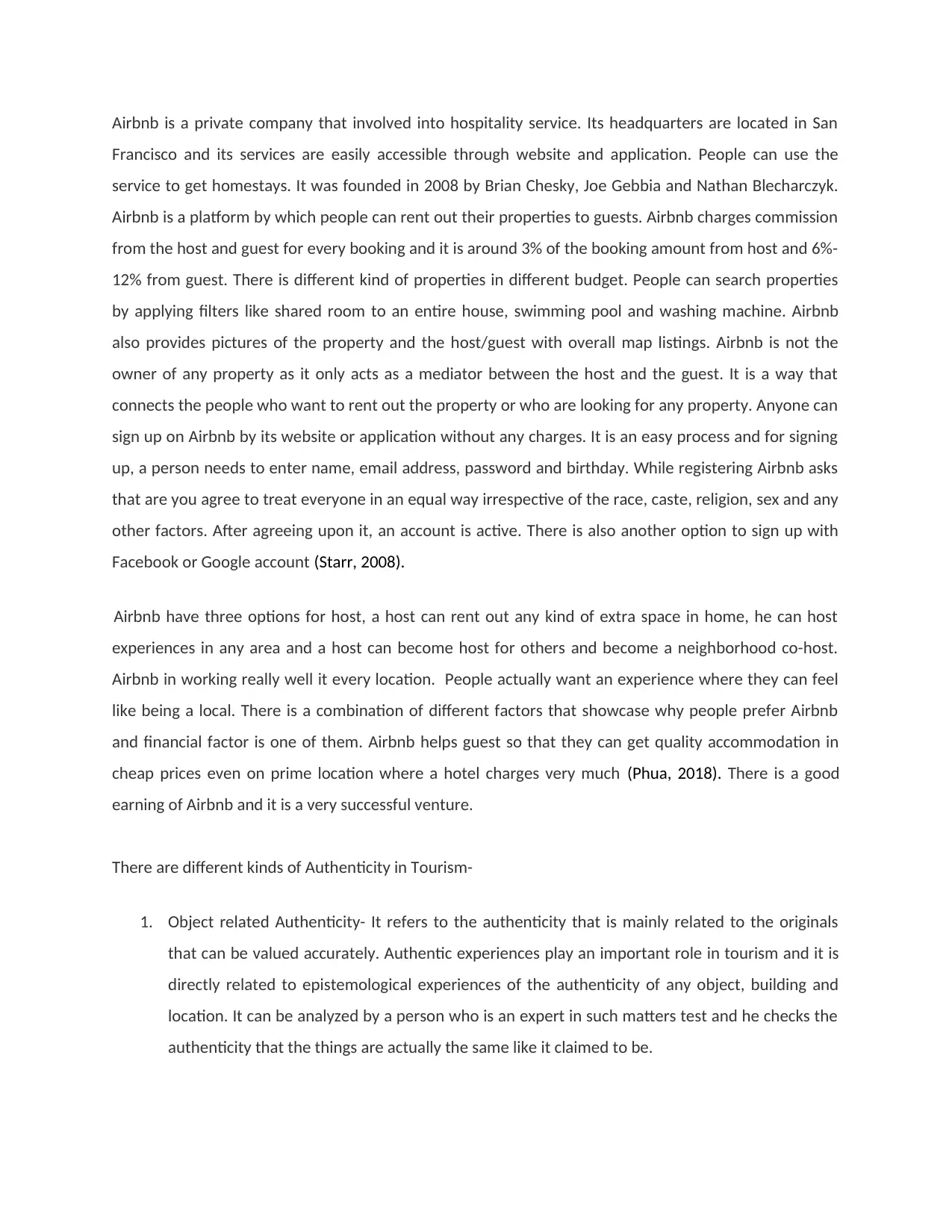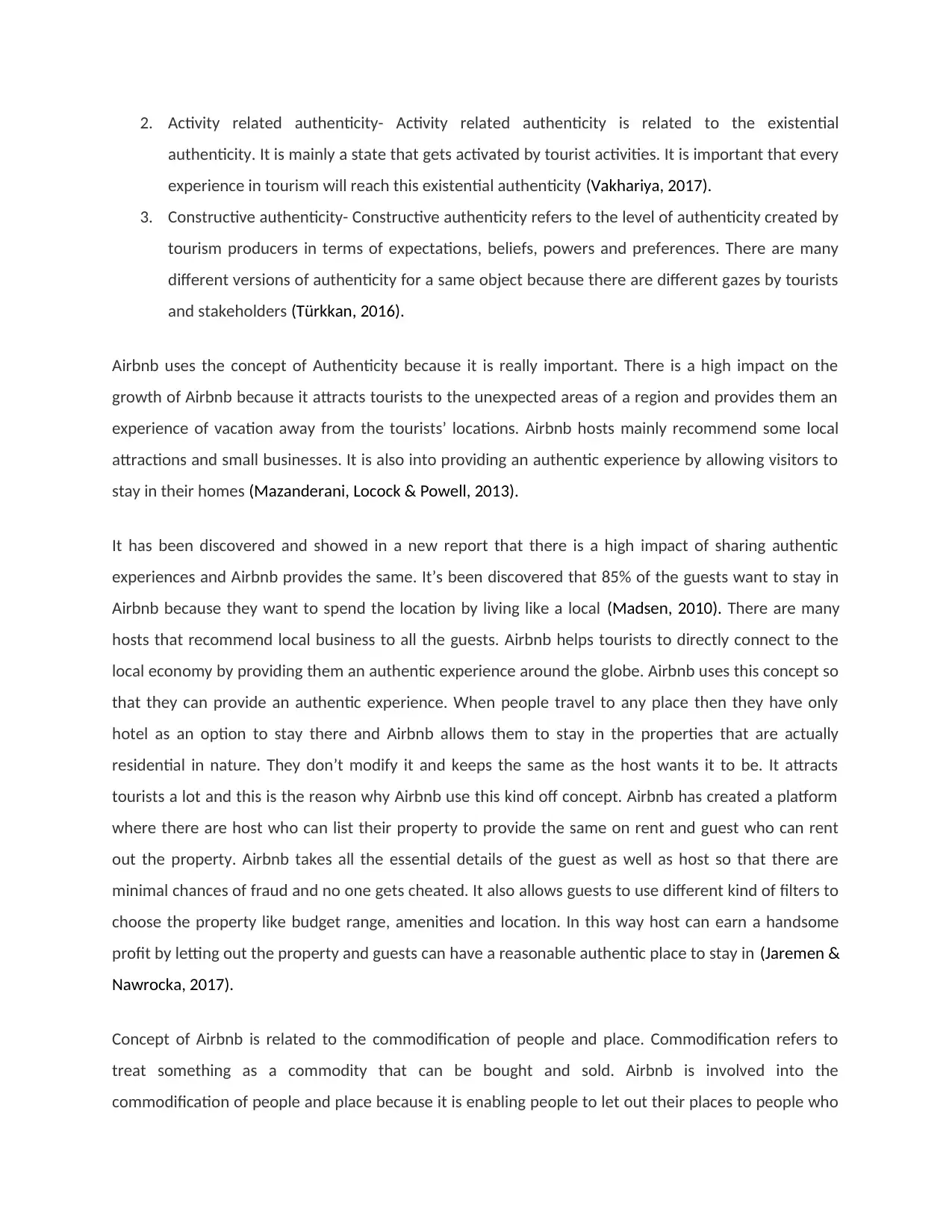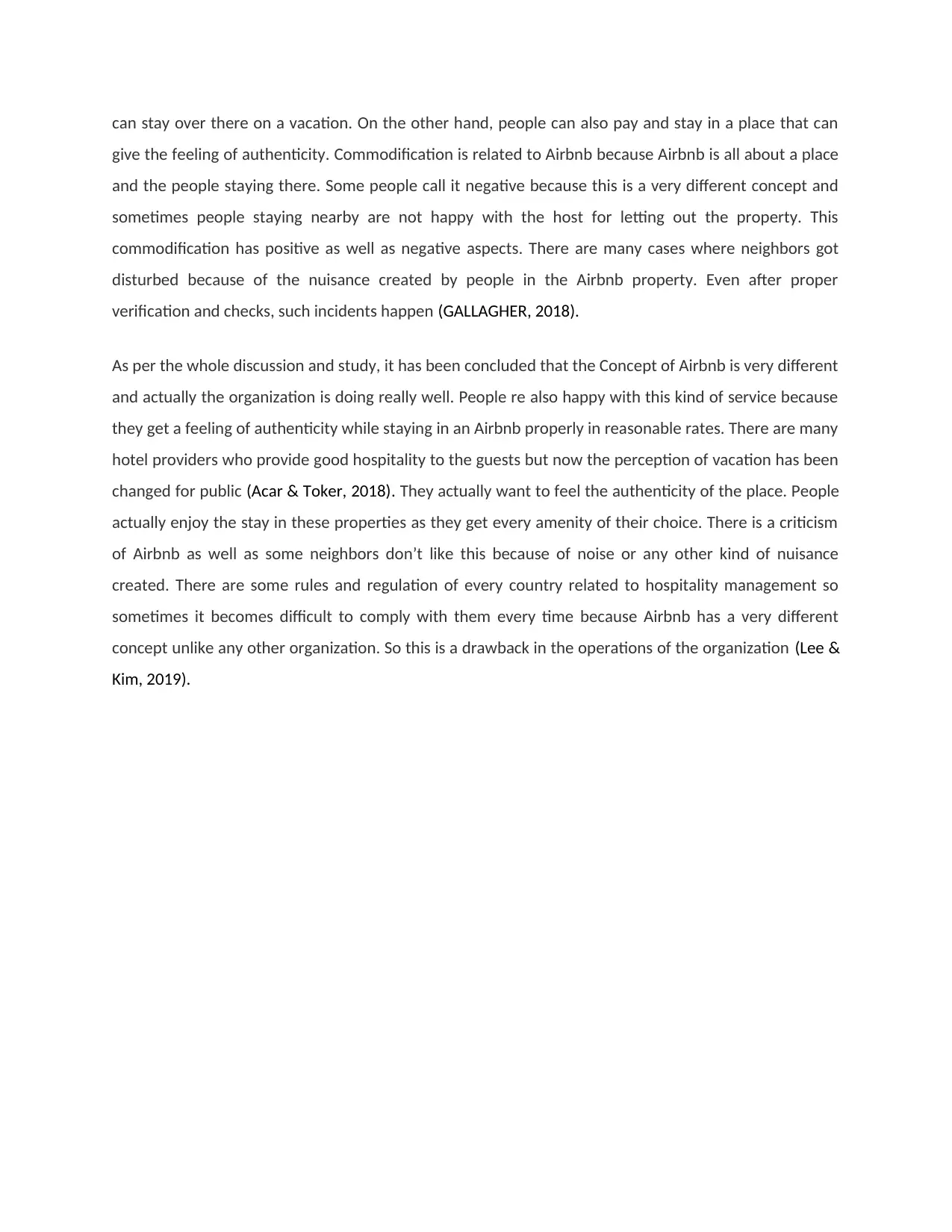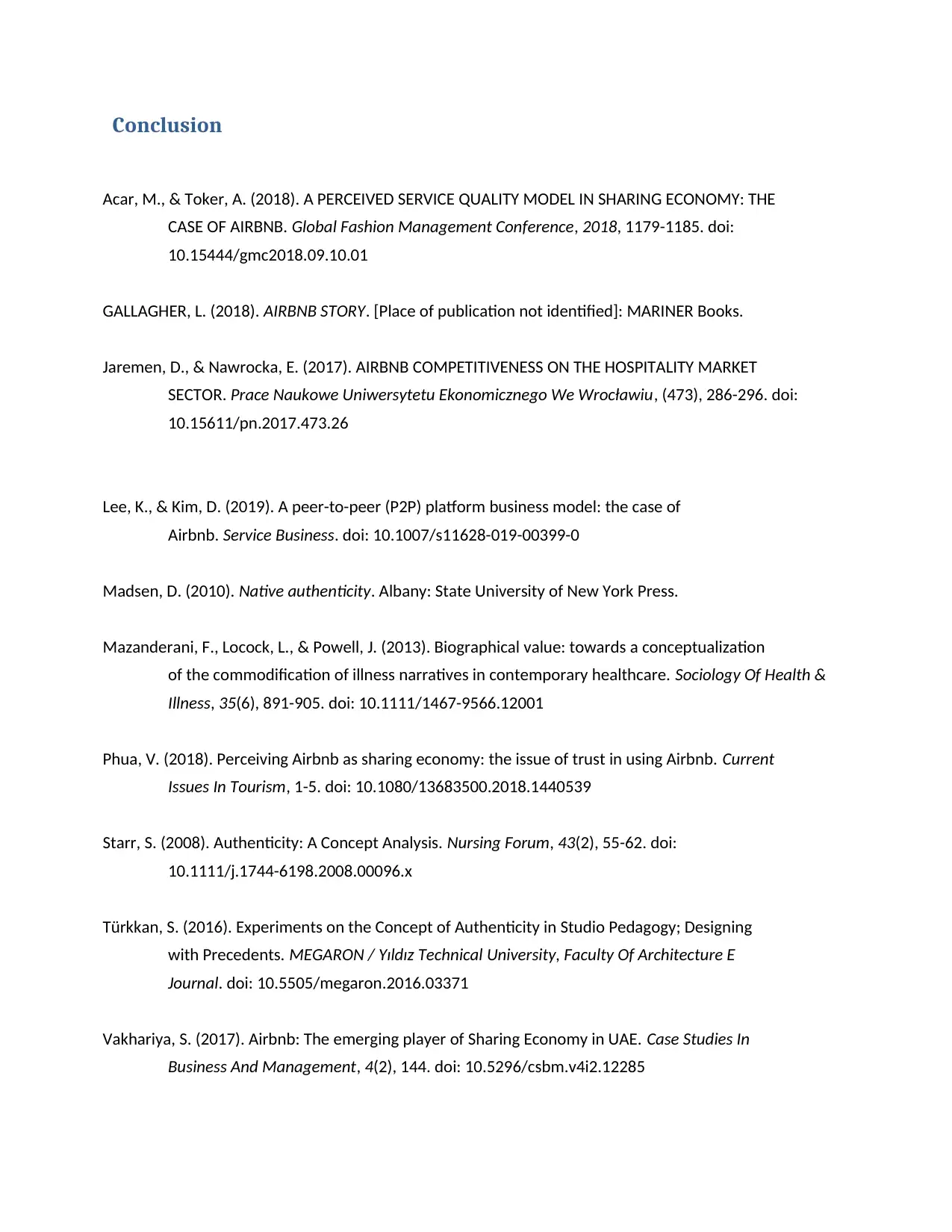HOS651 Report: An Analysis of Airbnb's People and Place Management
VerifiedAdded on 2023/01/16
|5
|1669
|83
Report
AI Summary
This report provides a comprehensive analysis of Airbnb, focusing on its people and organizational management strategies within the hospitality sector. It examines Airbnb's business model, including its role as a platform connecting hosts and guests, and the commission structure involved. The report explores the concept of authenticity in tourism, differentiating between object, activity, and constructive authenticity, and how Airbnb leverages these concepts to provide unique experiences. It further delves into the commodification of people and place, discussing the positive and negative aspects of Airbnb's approach, including the impact on local communities. The report concludes by highlighting Airbnb's success, the changing perceptions of vacation experiences, and the challenges the company faces regarding regulations and compliance, offering insights into the future of the sharing economy in the hospitality industry. The report includes references to relevant academic literature supporting its findings.

People and Organizational Management
Paraphrase This Document
Need a fresh take? Get an instant paraphrase of this document with our AI Paraphraser

Airbnb is a private company that involved into hospitality service. Its headquarters are located in San
Francisco and its services are easily accessible through website and application. People can use the
service to get homestays. It was founded in 2008 by Brian Chesky, Joe Gebbia and Nathan Blecharczyk.
Airbnb is a platform by which people can rent out their properties to guests. Airbnb charges commission
from the host and guest for every booking and it is around 3% of the booking amount from host and 6%-
12% from guest. There is different kind of properties in different budget. People can search properties
by applying filters like shared room to an entire house, swimming pool and washing machine. Airbnb
also provides pictures of the property and the host/guest with overall map listings. Airbnb is not the
owner of any property as it only acts as a mediator between the host and the guest. It is a way that
connects the people who want to rent out the property or who are looking for any property. Anyone can
sign up on Airbnb by its website or application without any charges. It is an easy process and for signing
up, a person needs to enter name, email address, password and birthday. While registering Airbnb asks
that are you agree to treat everyone in an equal way irrespective of the race, caste, religion, sex and any
other factors. After agreeing upon it, an account is active. There is also another option to sign up with
Facebook or Google account (Starr, 2008).
Airbnb have three options for host, a host can rent out any kind of extra space in home, he can host
experiences in any area and a host can become host for others and become a neighborhood co-host.
Airbnb in working really well it every location. People actually want an experience where they can feel
like being a local. There is a combination of different factors that showcase why people prefer Airbnb
and financial factor is one of them. Airbnb helps guest so that they can get quality accommodation in
cheap prices even on prime location where a hotel charges very much (Phua, 2018). There is a good
earning of Airbnb and it is a very successful venture.
There are different kinds of Authenticity in Tourism-
1. Object related Authenticity- It refers to the authenticity that is mainly related to the originals
that can be valued accurately. Authentic experiences play an important role in tourism and it is
directly related to epistemological experiences of the authenticity of any object, building and
location. It can be analyzed by a person who is an expert in such matters test and he checks the
authenticity that the things are actually the same like it claimed to be.
Francisco and its services are easily accessible through website and application. People can use the
service to get homestays. It was founded in 2008 by Brian Chesky, Joe Gebbia and Nathan Blecharczyk.
Airbnb is a platform by which people can rent out their properties to guests. Airbnb charges commission
from the host and guest for every booking and it is around 3% of the booking amount from host and 6%-
12% from guest. There is different kind of properties in different budget. People can search properties
by applying filters like shared room to an entire house, swimming pool and washing machine. Airbnb
also provides pictures of the property and the host/guest with overall map listings. Airbnb is not the
owner of any property as it only acts as a mediator between the host and the guest. It is a way that
connects the people who want to rent out the property or who are looking for any property. Anyone can
sign up on Airbnb by its website or application without any charges. It is an easy process and for signing
up, a person needs to enter name, email address, password and birthday. While registering Airbnb asks
that are you agree to treat everyone in an equal way irrespective of the race, caste, religion, sex and any
other factors. After agreeing upon it, an account is active. There is also another option to sign up with
Facebook or Google account (Starr, 2008).
Airbnb have three options for host, a host can rent out any kind of extra space in home, he can host
experiences in any area and a host can become host for others and become a neighborhood co-host.
Airbnb in working really well it every location. People actually want an experience where they can feel
like being a local. There is a combination of different factors that showcase why people prefer Airbnb
and financial factor is one of them. Airbnb helps guest so that they can get quality accommodation in
cheap prices even on prime location where a hotel charges very much (Phua, 2018). There is a good
earning of Airbnb and it is a very successful venture.
There are different kinds of Authenticity in Tourism-
1. Object related Authenticity- It refers to the authenticity that is mainly related to the originals
that can be valued accurately. Authentic experiences play an important role in tourism and it is
directly related to epistemological experiences of the authenticity of any object, building and
location. It can be analyzed by a person who is an expert in such matters test and he checks the
authenticity that the things are actually the same like it claimed to be.

2. Activity related authenticity- Activity related authenticity is related to the existential
authenticity. It is mainly a state that gets activated by tourist activities. It is important that every
experience in tourism will reach this existential authenticity (Vakhariya, 2017).
3. Constructive authenticity- Constructive authenticity refers to the level of authenticity created by
tourism producers in terms of expectations, beliefs, powers and preferences. There are many
different versions of authenticity for a same object because there are different gazes by tourists
and stakeholders (Türkkan, 2016).
Airbnb uses the concept of Authenticity because it is really important. There is a high impact on the
growth of Airbnb because it attracts tourists to the unexpected areas of a region and provides them an
experience of vacation away from the tourists’ locations. Airbnb hosts mainly recommend some local
attractions and small businesses. It is also into providing an authentic experience by allowing visitors to
stay in their homes (Mazanderani, Locock & Powell, 2013).
It has been discovered and showed in a new report that there is a high impact of sharing authentic
experiences and Airbnb provides the same. It’s been discovered that 85% of the guests want to stay in
Airbnb because they want to spend the location by living like a local (Madsen, 2010). There are many
hosts that recommend local business to all the guests. Airbnb helps tourists to directly connect to the
local economy by providing them an authentic experience around the globe. Airbnb uses this concept so
that they can provide an authentic experience. When people travel to any place then they have only
hotel as an option to stay there and Airbnb allows them to stay in the properties that are actually
residential in nature. They don’t modify it and keeps the same as the host wants it to be. It attracts
tourists a lot and this is the reason why Airbnb use this kind off concept. Airbnb has created a platform
where there are host who can list their property to provide the same on rent and guest who can rent
out the property. Airbnb takes all the essential details of the guest as well as host so that there are
minimal chances of fraud and no one gets cheated. It also allows guests to use different kind of filters to
choose the property like budget range, amenities and location. In this way host can earn a handsome
profit by letting out the property and guests can have a reasonable authentic place to stay in (Jaremen &
Nawrocka, 2017).
Concept of Airbnb is related to the commodification of people and place. Commodification refers to
treat something as a commodity that can be bought and sold. Airbnb is involved into the
commodification of people and place because it is enabling people to let out their places to people who
authenticity. It is mainly a state that gets activated by tourist activities. It is important that every
experience in tourism will reach this existential authenticity (Vakhariya, 2017).
3. Constructive authenticity- Constructive authenticity refers to the level of authenticity created by
tourism producers in terms of expectations, beliefs, powers and preferences. There are many
different versions of authenticity for a same object because there are different gazes by tourists
and stakeholders (Türkkan, 2016).
Airbnb uses the concept of Authenticity because it is really important. There is a high impact on the
growth of Airbnb because it attracts tourists to the unexpected areas of a region and provides them an
experience of vacation away from the tourists’ locations. Airbnb hosts mainly recommend some local
attractions and small businesses. It is also into providing an authentic experience by allowing visitors to
stay in their homes (Mazanderani, Locock & Powell, 2013).
It has been discovered and showed in a new report that there is a high impact of sharing authentic
experiences and Airbnb provides the same. It’s been discovered that 85% of the guests want to stay in
Airbnb because they want to spend the location by living like a local (Madsen, 2010). There are many
hosts that recommend local business to all the guests. Airbnb helps tourists to directly connect to the
local economy by providing them an authentic experience around the globe. Airbnb uses this concept so
that they can provide an authentic experience. When people travel to any place then they have only
hotel as an option to stay there and Airbnb allows them to stay in the properties that are actually
residential in nature. They don’t modify it and keeps the same as the host wants it to be. It attracts
tourists a lot and this is the reason why Airbnb use this kind off concept. Airbnb has created a platform
where there are host who can list their property to provide the same on rent and guest who can rent
out the property. Airbnb takes all the essential details of the guest as well as host so that there are
minimal chances of fraud and no one gets cheated. It also allows guests to use different kind of filters to
choose the property like budget range, amenities and location. In this way host can earn a handsome
profit by letting out the property and guests can have a reasonable authentic place to stay in (Jaremen &
Nawrocka, 2017).
Concept of Airbnb is related to the commodification of people and place. Commodification refers to
treat something as a commodity that can be bought and sold. Airbnb is involved into the
commodification of people and place because it is enabling people to let out their places to people who
⊘ This is a preview!⊘
Do you want full access?
Subscribe today to unlock all pages.

Trusted by 1+ million students worldwide

can stay over there on a vacation. On the other hand, people can also pay and stay in a place that can
give the feeling of authenticity. Commodification is related to Airbnb because Airbnb is all about a place
and the people staying there. Some people call it negative because this is a very different concept and
sometimes people staying nearby are not happy with the host for letting out the property. This
commodification has positive as well as negative aspects. There are many cases where neighbors got
disturbed because of the nuisance created by people in the Airbnb property. Even after proper
verification and checks, such incidents happen (GALLAGHER, 2018).
As per the whole discussion and study, it has been concluded that the Concept of Airbnb is very different
and actually the organization is doing really well. People re also happy with this kind of service because
they get a feeling of authenticity while staying in an Airbnb properly in reasonable rates. There are many
hotel providers who provide good hospitality to the guests but now the perception of vacation has been
changed for public (Acar & Toker, 2018). They actually want to feel the authenticity of the place. People
actually enjoy the stay in these properties as they get every amenity of their choice. There is a criticism
of Airbnb as well as some neighbors don’t like this because of noise or any other kind of nuisance
created. There are some rules and regulation of every country related to hospitality management so
sometimes it becomes difficult to comply with them every time because Airbnb has a very different
concept unlike any other organization. So this is a drawback in the operations of the organization (Lee &
Kim, 2019).
give the feeling of authenticity. Commodification is related to Airbnb because Airbnb is all about a place
and the people staying there. Some people call it negative because this is a very different concept and
sometimes people staying nearby are not happy with the host for letting out the property. This
commodification has positive as well as negative aspects. There are many cases where neighbors got
disturbed because of the nuisance created by people in the Airbnb property. Even after proper
verification and checks, such incidents happen (GALLAGHER, 2018).
As per the whole discussion and study, it has been concluded that the Concept of Airbnb is very different
and actually the organization is doing really well. People re also happy with this kind of service because
they get a feeling of authenticity while staying in an Airbnb properly in reasonable rates. There are many
hotel providers who provide good hospitality to the guests but now the perception of vacation has been
changed for public (Acar & Toker, 2018). They actually want to feel the authenticity of the place. People
actually enjoy the stay in these properties as they get every amenity of their choice. There is a criticism
of Airbnb as well as some neighbors don’t like this because of noise or any other kind of nuisance
created. There are some rules and regulation of every country related to hospitality management so
sometimes it becomes difficult to comply with them every time because Airbnb has a very different
concept unlike any other organization. So this is a drawback in the operations of the organization (Lee &
Kim, 2019).
Paraphrase This Document
Need a fresh take? Get an instant paraphrase of this document with our AI Paraphraser

Conclusion
Acar, M., & Toker, A. (2018). A PERCEIVED SERVICE QUALITY MODEL IN SHARING ECONOMY: THE
CASE OF AIRBNB. Global Fashion Management Conference, 2018, 1179-1185. doi:
10.15444/gmc2018.09.10.01
GALLAGHER, L. (2018). AIRBNB STORY. [Place of publication not identified]: MARINER Books.
Jaremen, D., & Nawrocka, E. (2017). AIRBNB COMPETITIVENESS ON THE HOSPITALITY MARKET
SECTOR. Prace Naukowe Uniwersytetu Ekonomicznego We Wrocławiu, (473), 286-296. doi:
10.15611/pn.2017.473.26
Lee, K., & Kim, D. (2019). A peer-to-peer (P2P) platform business model: the case of
Airbnb. Service Business. doi: 10.1007/s11628-019-00399-0
Madsen, D. (2010). Native authenticity. Albany: State University of New York Press.
Mazanderani, F., Locock, L., & Powell, J. (2013). Biographical value: towards a conceptualization
of the commodification of illness narratives in contemporary healthcare. Sociology Of Health &
Illness, 35(6), 891-905. doi: 10.1111/1467-9566.12001
Phua, V. (2018). Perceiving Airbnb as sharing economy: the issue of trust in using Airbnb. Current
Issues In Tourism, 1-5. doi: 10.1080/13683500.2018.1440539
Starr, S. (2008). Authenticity: A Concept Analysis. Nursing Forum, 43(2), 55-62. doi:
10.1111/j.1744-6198.2008.00096.x
Türkkan, S. (2016). Experiments on the Concept of Authenticity in Studio Pedagogy; Designing
with Precedents. MEGARON / Yıldız Technical University, Faculty Of Architecture E
Journal. doi: 10.5505/megaron.2016.03371
Vakhariya, S. (2017). Airbnb: The emerging player of Sharing Economy in UAE. Case Studies In
Business And Management, 4(2), 144. doi: 10.5296/csbm.v4i2.12285
Acar, M., & Toker, A. (2018). A PERCEIVED SERVICE QUALITY MODEL IN SHARING ECONOMY: THE
CASE OF AIRBNB. Global Fashion Management Conference, 2018, 1179-1185. doi:
10.15444/gmc2018.09.10.01
GALLAGHER, L. (2018). AIRBNB STORY. [Place of publication not identified]: MARINER Books.
Jaremen, D., & Nawrocka, E. (2017). AIRBNB COMPETITIVENESS ON THE HOSPITALITY MARKET
SECTOR. Prace Naukowe Uniwersytetu Ekonomicznego We Wrocławiu, (473), 286-296. doi:
10.15611/pn.2017.473.26
Lee, K., & Kim, D. (2019). A peer-to-peer (P2P) platform business model: the case of
Airbnb. Service Business. doi: 10.1007/s11628-019-00399-0
Madsen, D. (2010). Native authenticity. Albany: State University of New York Press.
Mazanderani, F., Locock, L., & Powell, J. (2013). Biographical value: towards a conceptualization
of the commodification of illness narratives in contemporary healthcare. Sociology Of Health &
Illness, 35(6), 891-905. doi: 10.1111/1467-9566.12001
Phua, V. (2018). Perceiving Airbnb as sharing economy: the issue of trust in using Airbnb. Current
Issues In Tourism, 1-5. doi: 10.1080/13683500.2018.1440539
Starr, S. (2008). Authenticity: A Concept Analysis. Nursing Forum, 43(2), 55-62. doi:
10.1111/j.1744-6198.2008.00096.x
Türkkan, S. (2016). Experiments on the Concept of Authenticity in Studio Pedagogy; Designing
with Precedents. MEGARON / Yıldız Technical University, Faculty Of Architecture E
Journal. doi: 10.5505/megaron.2016.03371
Vakhariya, S. (2017). Airbnb: The emerging player of Sharing Economy in UAE. Case Studies In
Business And Management, 4(2), 144. doi: 10.5296/csbm.v4i2.12285
1 out of 5
Related Documents
Your All-in-One AI-Powered Toolkit for Academic Success.
+13062052269
info@desklib.com
Available 24*7 on WhatsApp / Email
![[object Object]](/_next/static/media/star-bottom.7253800d.svg)
Unlock your academic potential
Copyright © 2020–2026 A2Z Services. All Rights Reserved. Developed and managed by ZUCOL.





